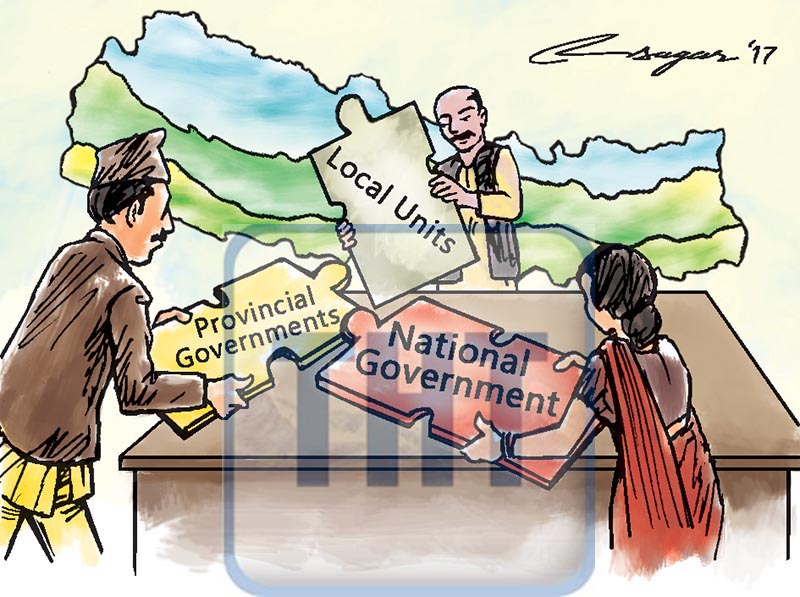Singha Durbar in Villages: Empty words or vision-in-progress?
DHANGADHI: “The Nepal Communist Party (NCP) has issued letters to the local representatives to resign from their posts. Security forces must consider this matter seriously. It is unfortunate that we are being targeted and threatened at a time when the nation is finally taking steps towards development and prosperity.’’
Dipayal Silgadhi Municipality Mayor Manju Malasi is anxious after receiving a ‘letter’ from Netra Bikram Chand led NCP. The elected representatives were, as it is, dealing with the lack of human resources in the offices, apt laws and adequate physical infrastructure at the local levels -- factors holding them from performing their duties. NCP’s postal correspondence last week, threatening the representatives to resign, has now added to their existing woes.
Malasi added that the delay in forming provincial laws and regulations is posing as a major challenge for the local level authorities.
“If the laws formed by the local authorities clash with the provincial laws, they will automatically be void. As such, we cannot formulate these laws in a rush."
Likewise, Chief of Bogatan Rural Municipality, Kamal Gadsila expressed concern over Nepali youth selling their labour for cheap in India. “We’ve spent over five crore rupees on roads alone in the current fiscal, the majority amount actually going out of the rural municipality while our youth are compelled to sell their labour for cheap across the border,” Gadsila said, adding, “the province government should now introduce the concept of labour-bank."
"They should also implement laws that discourage destruction of nature and natural resources in the name of development,” said Gadsila.
Another local government representative of the district, Chief of Adarsha Rural Municipality Tek Bahadur Rokaya said, the roads that are currently being constructed in the rural areas must not be compromised with in terms of quality. He pointed at the possibility of rampant accidents occurring in low-quality, rough roads due to negligence over meeting standards of road-construction.
Similarly, according to Purvichauki Rural Municipality Chief Dirgha Raj Bogati, local bodies are facing difficulty in performing as planned due to lack of adequate physical infrastructure and unavailability of proper human resources.
“I had in fact devised a plan to develop this rural municipality using four Ja’s- JaI (Water), Jamin (Land), Jadibuti (Herbs) and Jungle (or Forest). It turns out things do not always and necessarily move according to plans,” shared Bogati.
Shikhar Municipality Chief Sitaram Joshi has his own tale to narrate. “The constant hailstorms in the district that have destroyed the agricultural produce of the farmers have jeopardised their food-supply rights,” stated Joshi. Talking about the issues in education sector, Joshi said that the merger of schools, deputation of teachers, etc could pose as major challenges in institutionalising quality education.
Buddhisagar Binadi, Chief of Baddi Kedar Rural Municipality said that the local representatives have not been able to operate at par with heavy expectations and demands of the public. He also pointed towards the issue of lack of physical infrastructure and adequate human resources that affect the local bodies' performance.
“When the local bodies were being accorded rights as per the constitution, the big leaders made huge claims about Singha Durbar reaching villages. However the state of Singhas (Lions) of the village, in reality, is absolutely pitiful,” shared Ram Chandra Rana, Chief of KI Singh Rural Municipality.
“The local public along with the government officials threaten us,” said Rana.
Likewise, Sayal Rural Municipality Chief Tej Bahadur Dumrel said that there have been no sincere efforts to resume the three small-scale hydro-power projects that were completely destroyed during the 2072 floods. Like his fellow district rural municipality chiefs, Dumrel said that the local bodies have not been able to function to their full potential because of the delay in formulation of provincial laws, which in turn is hampering the local level regulations.
“It has been said many a times that Singha Durbar will now come to the villages, to the rural people. However, we have not been able to make people realise the same.”
A local representative stated that the government officials stationed at the district are yet to accept them as elected representatives. He further claimed that there is no bounds to the officials’ acting on free-will, ignoring the set regulations.
“It is very convenient to blame the local authorities and say that they are not performing. But nobody is even willing to give a thought to our problems or these obstacles that fall on our way.”






